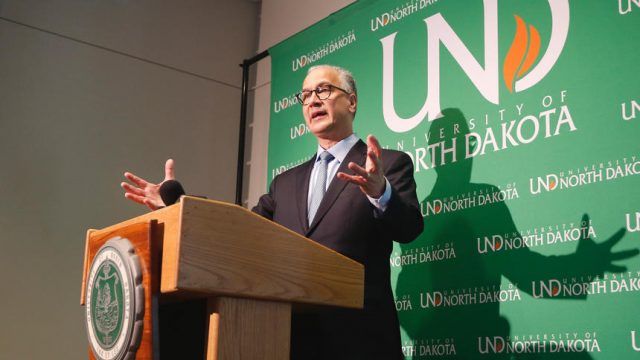Slaughtering Sacred Cows Is Hard Work

Mark Kennedy addresses people after being selected as the next President of the University of North Dakota Tuesday at the Gorecki alumni center. Jesse Trelstad/ Grand Forks Herald
I have to take exception to my colleague Brad Schlossman’s characterization of the University of North Dakota’s approach to making cuts to the athletics department.
“In next week’s act of the Three-Ring Circus, six UND head coaches will be paraded in front of the Intercollegiate Athletics Committee and new President Mark Kennedy. They will be given roughly 20 minutes to beg for their jobs and the future of their programs,” he writes. “Could there be a more demeaning and insulting way to continue this process?”
Schlossman is a talented reporter – he’s very, very good at his job – so I’m reticent to be critical, but this strikes me as hyperbole.
Schlossman also objects to the constitution of the committee considering the cuts, noting that it’s “made up of half professors and half athletic representatives” and thus “is not fit to be making big decisions about the athletic department.”
[mks_pullquote align=”right” width=”300″ size=”24″ bg_color=”#ffffff” txt_color=”#000000″]Collegiate athletics are very popular in America generally and in North Dakota specifically. They are perhaps the most visible and popular programs our state universities offer. And I get it; sports are fun. But they are not, and cannot be, priority number one at these universities.[/mks_pullquote]
President Kennedy must guide UND through budget reductions even beyond what interim President Ed Schafer instituted earlier this year. That’s a mathematical reality given the State of North Dakota’s falling revenues. And Kennedy has made it clear that athletics is a sacred cow he’s willing to slaughter to make ends meet.
For Schlossman to call it “demeaning” for athletics department leaders to justify their budgets illustrates, for me, poor priorities which are all too common when we talk about higher education. It’s remarkable to me that athletics is given equal footing with academic programs at all when it comes to the budget. Sports programs are, after all, not the reason why the public builds and maintains institutions of higher education.
In my mind, if funds run short athletics, should always be first hit.
Maybe some of the pique over this effort to make cuts to athletics programs stems from the fact that athletics typically isn’t held accountable in this fashion. If so, too bad. The sports programs need to take their medicine too.
And for Schlossman to suggest that personnel from the university’s academic programs shouldn’t be involved in considering these cuts is a little ridiculous. Not only do these people staff the programs which are the primary purpose of the institution, but whatever cuts aren’t made to athletics will have to be made in their departments.
Their views on those cuts should matter.
Collegiate athletics are very popular in America generally and in North Dakota specifically. They are perhaps the most visible and popular programs our state universities offer. And I get it; sports are fun.
But they are not, and cannot be, priority number one at these universities.
President Kennedy has to fill a budget short fall at his institution, and it looks like he’s going to do that in part by cleaning up the sports programs dropping less popular programs and focusing on those most popular with the public. “Sports are going to be cut. Kennedy has continually stated his desire to win championships and fund spotlight sports at high levels,” Schlossman writes. “That means cutting some sports to better fund others, if you read between the lines.”
If what we’re reading between those lines is accurate, then Kennedy should be commended not criticized.




